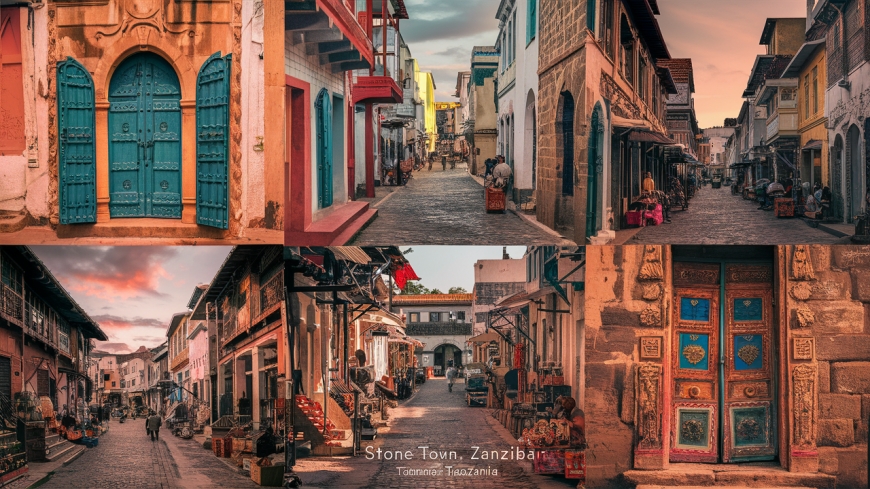Stone Town: A Jewel of Tanzanian History and Culture
Stone Town, located on the western coast of the Zanzibar Archipelago in Tanzania, stands as a testament to centuries of vibrant history, cultural exchange, and architectural grandeur.

Stone Town, located on the western coast of the Zanzibar Archipelago in Tanzania, stands as a testament to centuries of vibrant history, cultural exchange, and architectural grandeur. Its narrow streets, labyrinthine alleys, and historic buildings carry the whispers of Swahili, Arab, Persian, Indian, and European influences, making it a unique Africa safari destination for travelers seeking to immerse themselves in the rich tapestry of East African heritage.
Historical Context:
Stone Town's history is deeply intertwined with the Indian Ocean trade routes, which facilitated the exchange of goods, ideas, and people between Africa, the Middle East, and Asia. From the 8th century onwards, Stone Town flourished as a trading hub, attracting merchants from distant lands and fostering a cosmopolitan atmosphere that remains palpable today.
Architectural Marvels:
The architecture of Stone Town reflects its diverse cultural heritage. Arab, Indian, and European architectural styles blend seamlessly with traditional Swahili design principles, creating a captivating visual landscape.
1. Arab Influences: Ornate wooden doors, intricate carvings, and elegant balconies characterize many of Stone Town's buildings, reflecting the influence of Arab traders who settled in the region. The Sultan's Palace, also known as the Beit al-Sahel, exemplifies this architectural style with its majestic white facade and ornamental details.
2. Swahili Architecture: Swahili architecture, characterized by coral stone structures, flat roofs, and inner courtyards, is prevalent throughout Stone Town. The Old Fort, constructed by the Omani Arabs in the 17th century, is a prime example of Swahili military architecture, with its formidable walls and commanding presence along the waterfront.
3. Indian Influences: The infusion of Indian architectural elements, such as intricate wooden latticework and vibrant color schemes, is evident in many of Stone Town's buildings. The House of Wonders, originally constructed by Sultan Barghash in the late 19th century, showcases Indo-Arab influences with its distinctive clock tower and ornate balconies.
Cultural Tapestry:
Beyond its architectural splendor, Stone Town pulsates with cultural vibrancy, manifested through its diverse population, culinary traditions, and artistic expressions.
1. Cultural Fusion: The cultural fabric of Stone Town is woven from the threads of Swahili, Arab, Indian, and European influences, resulting in a dynamic blend of languages, cuisines, and customs. Visitors can explore bustling markets, where the aromas of Zanzibari spices mingle with the sounds of merchants haggling and muezzins calling the faithful to prayer.
2. Music and Dance: Music and dance are integral components of Zanzibari culture, reflecting the island's storied past and vibrant present. Taarab music, characterized by melodious vocals and intricate instrumentation, serves as a living testament to the island's multicultural heritage, while ngoma drumming resonates with the rhythms of African tradition.
3. Culinary Delights: Zanzibari cuisine tantalizes the senses with its fusion of flavors and spices. From aromatic biryanis and succulent seafood dishes to sweet treats like kashata and mkate wa halwa, Stone Town offers beach honeymoon safaris like no other. Visitors can sample street food delicacies at the Forodhani Gardens night market or savor traditional Swahili fare at local eateries.
Preservation Efforts:
In recent years, efforts have been made to preserve Stone Town's architectural heritage and cultural legacy. Organizations such as the Stone Town Conservation and Development Authority (STCDA) work to safeguard historic buildings, promote sustainable tourism, and foster community engagement.
1. Conservation Initiatives: Restoration projects aim to protect and revitalize key landmarks, ensuring that future generations can appreciate Stone Town's architectural treasures. By preserving historic buildings and promoting responsible tourism practices, stakeholders strive to strike a balance between heritage conservation and economic development.
2. Cultural Tourism: Cultural tourism initiatives offer visitors the opportunity to explore Stone Town's rich history and cultural diversity through guided tours, cultural performances, and interactive experiences. By engaging with local communities and supporting heritage-based enterprises, tourists can contribute to the preservation and promotion of Zanzibar's cultural heritage.
Challenges and Opportunities:
While Stone Town's allure is undeniable, the historic district faces various challenges, including urbanization, infrastructure development, and environmental degradation. Balancing the preservation of heritage with the demands of modernity requires innovative solutions and sustainable development strategies.
1. Urban Renewal: Rapid urbanization and population growth exert pressure on Stone Town's infrastructure and architectural integrity. Comprehensive urban renewal initiatives seek to address infrastructure deficiencies, improve public services, and enhance the quality of life for residents while safeguarding the city's cultural heritage.
2. Environmental Sustainability: Climate change poses a significant threat to Stone Town's coastal ecosystem, with rising sea levels and extreme weather events endangering vulnerable communities and historic structures. Implementing climate adaptation measures, such as coastal protection strategies and sustainable land use planning, is essential to mitigate the impact of environmental degradation.
Conclusion:
Stone Town, with its labyrinthine streets, architectural marvels, and vibrant cultural tapestry, embodies the spirit of East Africa's coastal heritage. From its Arab-influenced palaces to its bustling bazaars and lively waterfront, the historic district continues to captivate travelers with its timeless charm and enduring legacy. As stewards of Stone Town's cultural heritage, it is incumbent upon us to preserve, protect, and celebrate this jewel of Tanzanian history for generations to come.
What's Your Reaction?






























